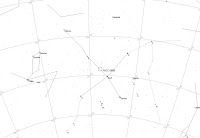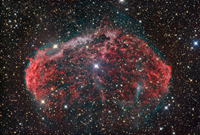OBSERVING REPORT
NGC 6888 - THE CRESCENT NEBULA in Cygnus
Date: August 15, 2012
Time: -
Telescope: 24" (61cm.) f/4
Observer: Leo Cavagnaro
Finder Chart
How to find it,
NGC 6888 is an easy object to see through a 24" telescope working at low magnification (60x) and an OIII filter. NGC
6888 is associated with WR 136 (HD 192163), considered
to be a member of the Cygnus OB1 association. The observations
of 62 galactic WR stars in the northern sky show
that about half are associated with nebular emission
(Miller and Chu 1993), some of which are ring
nebulae. Johnson and Hogg (1965) were the first
to propose that these ring nebulae were formed by
stellar wind interaction with the local interstellar
medium.
At the mentioned magnification, this nebula looks clearly elongated with an oval shape and the rim showing higher brightness. The small area indicated by the arrow in the DSS image (left) is the brightest part of this object. The northeast rim looks brighter and narrower than the opposite one, which looks wider and fainter. The inner part of this object is less prominent in nebulosity, appearing fainter.
NGC 6888 - THE CRESCENT NEBULA in Cygnus
Date: August 15, 2012
Time: -
Telescope: 24" (61cm.) f/4
Observer: Leo Cavagnaro
 |
| Click on the image to enlarge |
How to find it,
About 2°45' to the southwest of the 2.2 visual magnitude star Sadr (γ Cygni).
Stars in map up to visual magnitude 6.
At the mentioned magnification, this nebula looks clearly elongated with an oval shape and the rim showing higher brightness. The small area indicated by the arrow in the DSS image (left) is the brightest part of this object. The northeast rim looks brighter and narrower than the opposite one, which looks wider and fainter. The inner part of this object is less prominent in nebulosity, appearing fainter.


